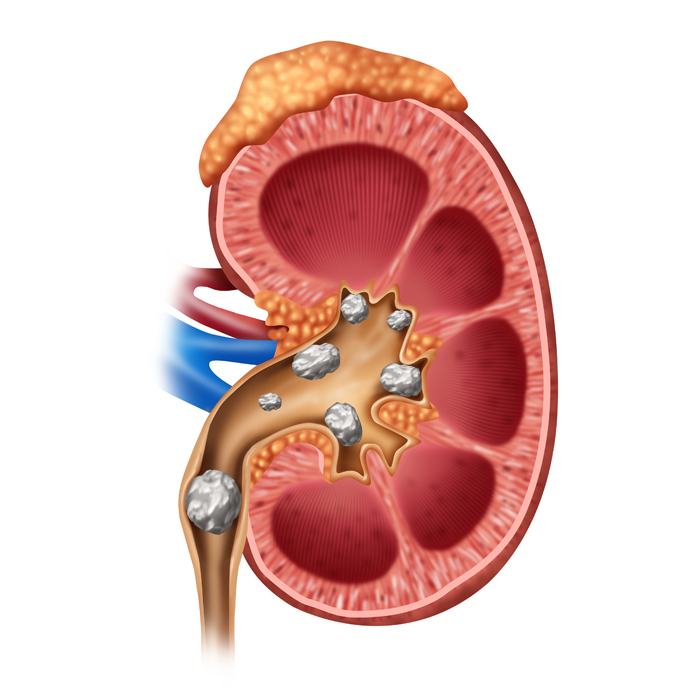Kidney Stones Treatment & Diagnostics in Tardeo, Mumbai
Kidney Stones
Kidney stones, also known as renal calculi, are defined as masses of crystal that are found in your kidneys or anywhere along your urinary tract. Kidney stones are caused by many factors such as a family history of kidney stones, obesity and if you have a high protein and sugar diet.
There are different methods of treatment for kidney stones. If your kidney stones are small, then your doctor will recommend some medications and lots of water to flush out the stones. If your kidney stones are big, then there are procedures such as ureteroscopy to remove them.

What is a kidney stone?
The primary function of your kidneys is to remove waste and fluid from your body in the form of urine. But when the waste builds up in your kidneys and they are not flushed out of your body, they become solid lumps called kidney stones.
To seek treatment, you can search online for a urology hospital near me or a urology doctor near me.
What are the types of kidney stones?
These include:
- Calcium Stones - These stones are made of calcium or phosphate along with high amounts of oxalate. Oxalate is a natural chemical found in potatoes, peanuts, chocolates, etc.
- Uric Acid - This type of stone is generally more common in men. These stones are formed due to high amounts of acid in your urine.
- Struvite - This type of stone is found more in women. They are caused by urinary tract infections.
- Cystine - This type of stone is rare. It is formed due to a disorder called Cystinuria where the stones are made of cystine (sulphur-containing amino acid).
What are the symptoms of kidney stones?
Kidney stones cause an immense amount of discomfort and pain. There are telltale signs that include:
- Pain in your abdomen or back
- Blood in your urine
- Vomiting
- Frequent urination
- High fever
- Bad smelling urine
What are the causes of kidney stones?
These factors may predispose you to develop kidney stones. They are:
- If you have had kidney stones earlier
- If you have a family history of kidney stones
- Obesity
- Any kind of kidney diseases
- Irritable Bowel Syndrome that irritates your bowels
- If you take diuretics or any medication like calcium antacids
When should you consult a doctor?
It is time to see your doctor if you experience severe pain while urinating, brown or pink urine, blood in your urine, vomiting and trouble urinating.
Request an appointment at Apollo Spectra Hospitals, Tardeo, Mumbai.
Call 1860 500 2244 to book an appointment.
How is kidney stone diagnosed?
Your doctor will ask you to take a host of blood tests to get a better understanding of your problem. He/she will check your medical and family history as well.
Tests include:
- Blood tests that will check your electrolyte, calcium and uric acid levels
- Creatinine test and blood urea nitrogen test to examine the functioning of your kidneys
- Ultrasonography
- X-rays
What are the complications associated with kidney stones?
While kidney stones are mostly harmless, they can cause complications at times. When the stones pass down your ureter, they can cause irritation and spasms. That is why you see blood in your urine. They can also block urine, which is called urinary obstruction.
How is kidney stone treated?
Treatments include:
- Medications - Medications such as sodium bicarbonate, painkillers and diuretics to prevent calcium from depositing on your kidney stones
- Lithotripsy - If you have big stones that cannot pass on their own, then your doctor might recommend lithotripsy. This procedure involves using sound waves to break up the kidney stones so that they can pass without trouble through the ureter
- Ureteroscopy - This procedure involves inserting a tube with a camera in the urethra and using a cage to take out the stones
Conclusion
There are different methods of treatment for kidney stones. If you have small kidney stones, then your doctor will recommend some medication. He might advise you to drink lots of water to flush out the stones. If you have big kidney stones, then there are procedures such as ureteroscopy to remove them.
Your doctor might recommend that you eat less oxalate-rich food such as potatoes and chocolates and drink lots of water to keep yourself hydrated.
Kidney stones are more common in men. But women also get certain types of kidney stones called struvite.
Insufficient water intake, lack of exercise and high salty or sugary food can increase the risk of developing kidney stones.
Our Top Specialities
NOTICE BOARD
CONTACT US
CONTACT US
 Book Appointment
Book Appointment


.svg)
.svg)
.svg)
.svg)








